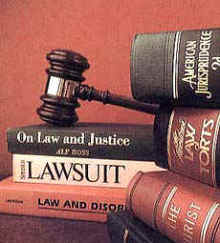Record labels go after USC downloaders

By Dawn C. Chmielewski and Jim Puzzanghera
Times Staff Writers
7:05 PM PST, February 28, 2007
If they don't quit illegally downloading music, some USC students may end up having to fight on ... in court.
The record industry's main trade group said Wednesday that it was mailing letters to 20 of the school's students whom it had identified as song bootleggers.
The letters warn that an expensive lesson awaits if the students don't stop the practice. Settle, the dispatches say, or be sued.
The mailings are part of a stepped-up legal fight by the Recording Industry Assn. of America against music downloading amid indications of a dramatic increase in the number of songs exchanged illegally via the Internet.
The association said that overall it was sending 400 warning letters to students at 13 universities to sue several thousand students.
"We'd rather not be doing these lawsuits ... but the fact remains that the college environment is one that has rampant piracy," said association Chairman Mitch Bainwol.
Omar Riza, 21, a USC student from Aliso Viejo, called the legal action heavy-handed. He said a friend of his was one of more than two dozen USC students sued by the trade group in 2005 for using file-sharing site i2hub. The industry demanded $21,000 in compensation for the downloaded songs, but later reduced that amount to $3,000, Riza said.
"This is an intellectual property issue," Riza said. "This isn't a crime of murder."
But others, such as Christina Carey, 19, believe that the industry has the right to go after students who illegally download.
"It's completely fair that the music industry would do that," said Carey. "They're getting robbed."
She said she never illegally downloaded music, but acknowledged there was a thin line between sharing and pirating. Carey makes CDs for friends, she said, but some of them won't accept copies of CDs even as gifts.
The mailings, which the industry calls "pre-litigation settlement letters," are being sent to each student's school. They warn that a suit might be filed against one of the school's students or employees and asks that the letter be immediately forwarded.
The student or employee then can settle for a smaller payment than the industry would seek in a lawsuit. The association says it will continue sending out 400 letters a month to universities where illegal downloading occurs on the schools' computer systems.
"We heard often from those who were caught in a lawsuit they wanted a way to settle earlier and wanted a way to avoid having anything part of a record in federal court," said Steven Marks, the industry group's general counsel. The settlements would require the person to agree not to illegally download music in the future and pay an undisclosed amount that is "substantially less than people are paying now."
USC received an e-mail Wednesday from the the trade group about the notices but said the university hasn't received any yet, university counsel Kelly Bendell said.
In the past the industry would issue a subpoena to USC seeking to learn the name of the person corresponding with the numeric Internet address of a suspected downloader, Bendell said. The school would notify the student that it had received a subpoena, and alert the student that he or she could file a motion seeking to quash it. Otherwise, the school would disclose the person's name.
Now, it appears that the industry wants the school to notify the student that it would like to negotiate a settlement before a suit is filed, Bendell said.
"I don't know yet how we'll handle that," said Bendell. "Most likely, we would go ahead and notify the student. Obviously, we would not turn over their names without receiving a subpoena."
The American Council On Education, which represents 1,800 colleges and universities, forwarded a letter about the plan from the trade group to the presidents of member schools along with the council's advice "to review the proposal with legal counsel and determine whether this approach makes sense for your campus."
Other major universities getting the letters include Arizona State, Syracuse, Nebraska, Tennessee, Texas and Massachusetts.
The industry has sued about 1,000 college students since 2004, when the group began its crackdown on campuses. Recent studies show colleges continue to be a hotbed of music piracy.
The market research firm NPD Group found a 55% surge in the number of files being exchanged on Internet file-sharing networks over the last year. College-age students — traditionally the most ardent music fans — account for 39% of all the unauthorized content that's illicitly traded.
Music fans 18 to 25 years old are increasingly getting their music for free, either by borrowing a friend's CD and importing the tracks onto their computers or by downloading bootlegged songs from peer-to-peer networks, on which data is exchanged between computers, according to NPD.
"There's a real zest for music, but unfortunately that desire is being filled by a lot of unpaid content," said Russ Crupnick, vice president of NPD.
The recording industry group also cited a recent survey by the University of Richmond that that found more than half of college students illegally download music and movies.
Josh Bernoff, an analyst with Forrester Research, said that threatening a lawsuit could be just as effective a deterrent as suing but wouldn't solve the campus piracy problem.
"As long as every CD that ships is filled with unprotected music, there's not much they can do about it," he said.